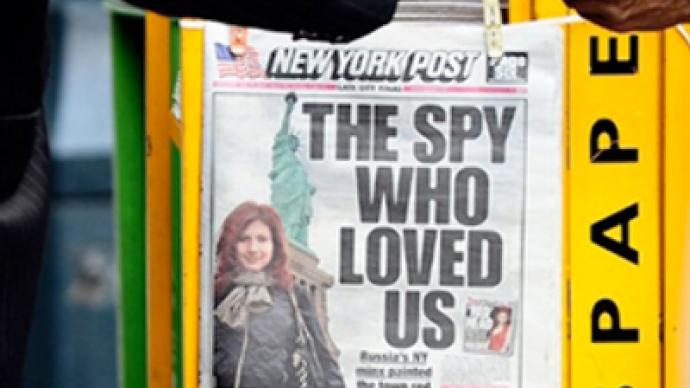Western media goes gaga over Russian “femme fatale”

Of the 11 suspects in America’s sting operation against alleged Russian spies, none has aroused more excited interest than Anna Chapman, 28, an attractive and successful entrepreneur.
After all, what would a Western spy thriller – especially one involving Russia, James Bond’s perennial arch enemy – be without some foxy femme fatale to keep the reader turning the pages in breathless anticipation?
Indeed, the Western media, enamored with Ms. Chapman’s farm-fresh looks and slight Siberian accent, has found an intriguing character to build its espionage story around. Yet despite constant allusions to “scenes straight out of a John Le Carre spy novel,” the most titillating thing to date about the “sexy young redhead” is her business prowess and ability for multitasking inside of coffee shops. Not necessarily the nuts and bolts of a successful spy thriller.
“Spy ring’s femme fatale,” screamed the New York Post on Tuesday, with the trailing eye candy in meaty black font: “Red-hot beauty snared in Russian ‘espionage’ shock.”
The article was accompanied with a photo gallery of Ms. Chapman, which made the report more resemble a Cosmopolitan beauty feature than any crime report. An entire third of the article was devoted to a Facebook photo of the Russian prima donna sporting a diamond-studded tiara, while three smaller photos – one taken in front of the Statue of Liberty – consumed yet more space. Finally, a sketch drawn by a courtroom artist, showing the accused sitting in a federal court in Manhattan, along with her somewhat less appealing fellow “spies”, ate up the remainder of the article’s real estate.
In another “breaking” news story, this one courtesy of CNN, attention is given solely to Ms. Chapman’s Bond-esque persona.
“This accused spy, Anna Chapman,” says Deborah Feyerick, a commentator, “she comes across as very engaging, ambitious, coy, at times flirtatious, and you can hear [here it comes, the most incriminating feature of all, the 007 connection] a hint of a British accent [!].”
John Palacio, an independent producer, interviewed Chapman in April during an entrepreneur’s conference. This is how he described her to CNN: “She is clearly well-spoken, very flirtatious, very attractive. When she walked into the room, she knew the power of her looks, and was able to sort of connect with all the people in the room – male and female, um, you know, give them that wink, that smile, and [she] understood the power of her sexuality…Clearly, she makes an impression when she walks into a room.”
CNN showed Palacio’s interview with Anna Chapman before the former offered his opinions, and none of the coquettish “wink and smile” qualities that the producer alluded to are apparent.
Indeed, Chapman, who moved to New York following a divorce in London, comes across as a serious, intelligent woman with more important things on her mind than how to seduce every hot-blooded male in the room. But defending Ms. Chapman on such terms does nobody any favors; indeed, it cheapens the entire process of news reporting.
By engaging in such shallow, superficial debates we fall into the trap that the Western media has – wittingly or unwittingly – set for the viewing public, and that is focusing undue attention on the physical features of Ms. Chapman [her attractiveness, her personality, her beguiling charm], as opposed to the very serious charges being leveled against her.
In another report, this one by The Star, it is described how an FBI agent, purporting to be a Russian agent, arranged an undercover face-to-face meeting with Chapman in another coffee shop in Manhattan, saying he had something important to give her.
During the meeting, the FBI agent asks Chapman to deliver a fraudulent passport to another individual. But the article, like so many others, fails to mention that Chapman, instead of “fulfilling her mission,” goes straight to the police with the passport.
This very serious fact barely arises as a counterargument to the allegations that Chapman was engaged in espionage. Rather, Chapman taking the documents to the police has had the very opposite effect: incriminating her even more.
Media reports suggest that it was Chapman’s “unwillingness to co-operate” with the undercover agent that forced the police to round up their Russian targets, for fear of “blowing the whole operation.” So while the Western media remains mesmerized by Ms. Chapman’s beauty and charm, nobody is asking why an alleged spy would risk drawing attention to herself by handing a fraudulent passport over to the US authorities.
Finally, there also remains the largely ignored question as to whether these Russians became the focus of specific groups who didn’t take kindly to the idea of new talent cutting into their profit margins, or worse, “infiltrating policy-making circles.”
“She’s a dynamic entrepreneur,” David Hantman, a fellow real estate agent who worked with Chapman, told the Associated Press. “She was just an attractive woman that liked to, you know, socialize, because what she was doing is to meet high-level people so she could make high-level deals.”
The AP video story fades out with an alluring photograph of Anna Chapman, posing in a frilly silk blouse with manicured hand resting on her chin, with these words: “Never did Hantman suspect that she could possibly be a spy, having secret meetings in a coffee shop…collecting ‘intel’ and passing it along to the Russians.”
There is just one problem with that concluding statement: it is absolutely false. Anna Chapman, who was the CEO of an international real estate company reportedly valued at $2 million, was not arrested for “passing along ‘intel’ to the Russians.” Rather, Chapman was arrested for working “as an agent of a foreign country without notifying the Attorney General’s office.”
So basically, until the US judicial system proves otherwise, Ms. Chapman is behind bars today due to a failure – either on her part, or the part of the US authorities – to properly register her activities with the government. Everything else in this case is pure, unadulterated media hype.
To trump up these relatively benign charges as “espionage” is a deliberate attempt by some group, possibly political opponents of the Obama White House, of destroying the reputation of some individuals who have not yet been given a fair trial.
Indeed, a fair trial is generally the last thing on the minds of media outlets in cases like these. The dilemma faced by journalists under such circumstances is whether to deliver the facts as they are known or to give the public what they want. Naturally, in an advertising-driven world, they tend towards the latter.
As the saying goes, never let the truth get in the way of a good story













